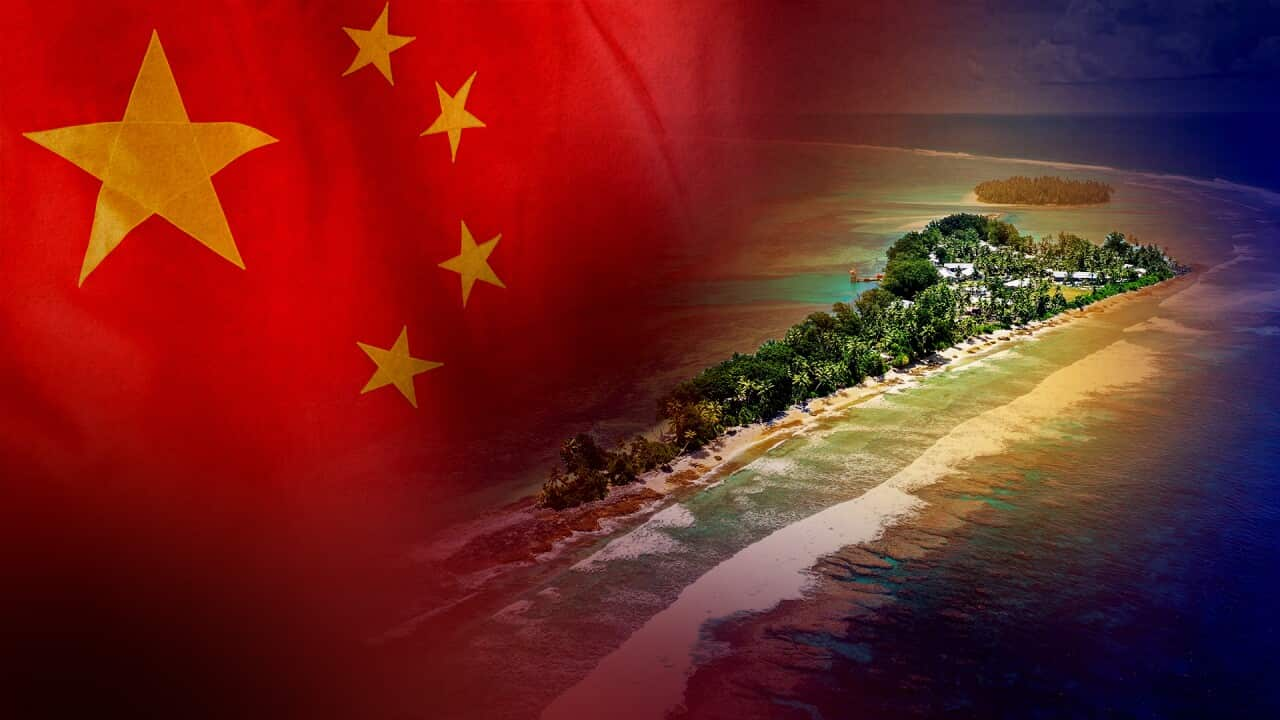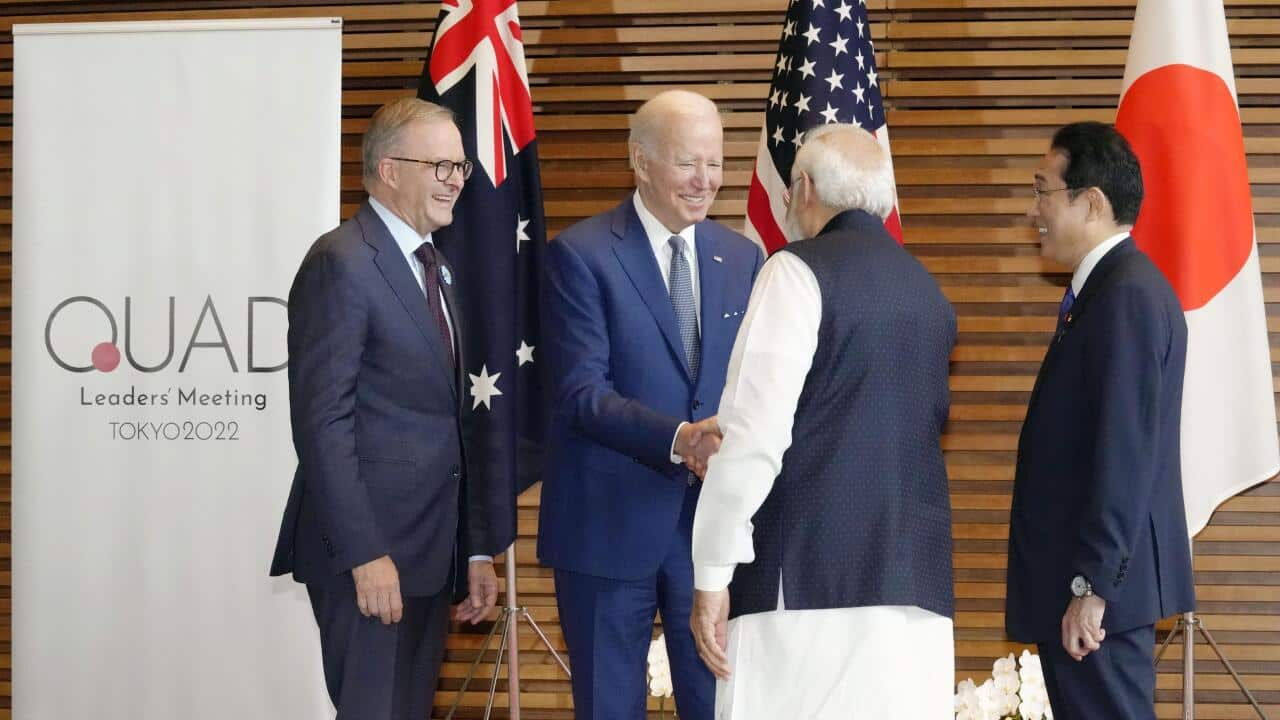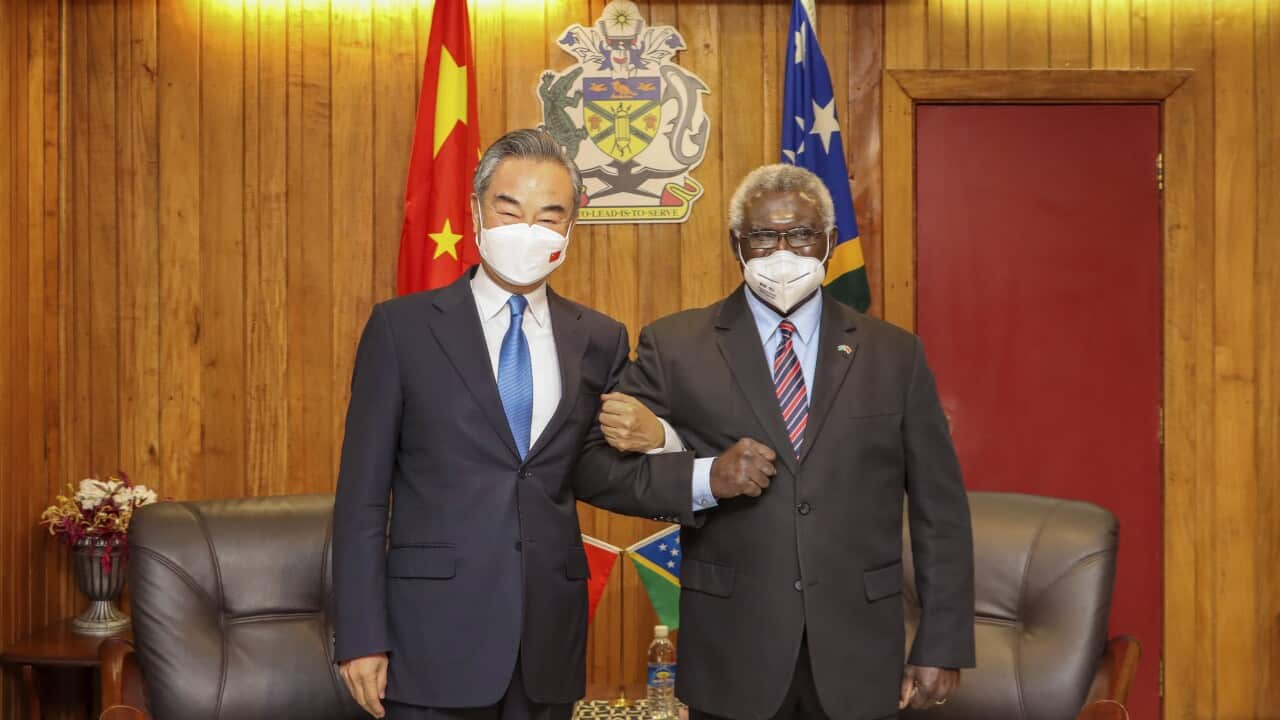China's growing influence in the Pacific is a "scary development" for the region, according to the former prime minister and current opposition leader of Pacific island nation Tuvalu.
In an interview with SBS News, Enele Sopoaga said comes at an unstable time for the region.
“The decision to take the draft is up to individual respective countries in the Pacific. But I think this is a rather scary development that we are hearing about now,” he said.
China is reportedly set to seek a region-wide deal with ten South Pacific island nations covering policing, security and data communications, when China’s Foreign Minister Wang Yi hosts a meeting in Fiji next week after a slew of diplomatic visits to Pacific nations.

Then prime minister of Tuvalu, Enele Sopoaga, at a press conference after the Leaders Retreat during the Pacific Islands Forum in Tuvalu in August 2019. Source: AAP / MICK TSIKAS
A new Cold War
Mr Sopoaga, who is also part of the Pacific Elders' Voices - an advisory group for the Pacific region - said he agrees with the president of Micronesia who compared the rising tension between China and the West to the Cold War.
“Island countries are becoming like a canary in a coal mine,” he said.
“We are being used as canaries to politicise and sell cheap cooperation and support in the name of exerting influence.”
“We are dealing with a most serious threat to this community of the region, which is climate change, and our focus cannot be sidetracked by any other so-called joint collaboration or corporations in the name of economic development of fisheries, this would all translate into political influence,” he said.
The president of the Federated States of Micronesia (FSM), David Panuelo, said his country would argue the "pre-determined joint communiqué" should be rejected, because he feared it could spark a new Cold War between China and the West.
The document states China and the Pacific will "strengthen exchanges and cooperation in the fields of traditional and non-traditional security".
"China will hold intermediate and high-level police training for Pacific Island Countries through bilateral and multilateral means," the document reads.
The communiqué also proposes a China-Pacific Islands Free Trade Area, and support for action on climate change and health.
When asked about Australia’s relationship with Pacific countries, Mr Sopoaga said Australia needs to start listening to their needs.
“Australia, I think, needs to listen better. And I certainly hope with the Labor government coming into administration, they need to close that gap to fill up that vacuum.”
“People all from all other sides of the world are dropping by visiting. Naturally, that would happen if there is a vacuum. So I think I would urge the new government to improve, step up its understanding and listen to the voices of foreign countries.”
Australia and China embark on competing Pacific visits
China and Australia launched competing visits to the Pacific on Thursday.
Australia’s newly sworn-in Foreign Minister Penny Wong ahead of her meeting with the country's prime minister on Thursday.
"The triple challenges of climate, COVID and strategic contest will challenge us in new ways. We understand that the security of any one Pacific family member rests on security for all,” she said.
"Australia will be a partner that won't come with strings attached, nor imposing unsustainable financial burdens," Senator Wong said in a thinly veiled reference to China, which has been criticised over its aggressive lending to poorer countries.
China's foreign minister is set to visit eight Pacific island nations that China has diplomatic ties with between 26 May and 4 June.
On his first stop on Wednesday to Solomon Islands, Mr Wang defended the , which gained objections from Australia, the United States, Japan and New Zealand over fears it could give China a military foothold in the region.
China rejects this, saying the pact is focused on domestic policing and that China has “no intention at all” to build a military base in Solomon Islands.
"China will, as always, firmly support the Solomon Islands in safeguarding national sovereignty, security and territorial integrity and safeguarding domestic unity," Mr Wang said during a meeting with his Solomon Islands counterpart.
When asked to respond to the leaked document, China's foreign ministry spokesman Wang Wenbin told a regular media briefing in Beijing that he was unaware of it, adding that China and South Pacific countries "are good friends and partners in mutual respect, equality and mutual benefit and common development".
"I do not agree at all with the argument that cooperation between China and the South Pacific island countries will trigger a new Cold War," he added.
Following his visit to Solomon Islands, Mr Wang is due to stop in Kiribati, Samoa, Fiji, Tonga, Vanuatu, Papua New Guinea and East Timor over the 10-day trip.
The meeting in Fiji on 30 May with Pacific foreign ministers is where he is expected to seek agreement on the five-year Pacific islands action plan.
Pacific nations in tug-of-war between China and Australia
Dr Joseph Veramu, a consultant on economic policy planning and development in Fiji, said Pacific countries like Fiji who have existing close relations with both China and Australia have been left in a difficult position.
“If Fiji leans too much to China, it comes across as being illiberal. Australia has effectively dictated the economic and democracy message in the Pacific, and Fiji and other Pacific nations with ties to China’s Belt and Road Initiative are now left in a quandary,” he said.
Mr Veramu said the relationship between Fiji and Australia has been the “best since 2006” and so the challenge now for Fiji's government is to engage with both China and Australia to garner the best outcomes for the country.
“Fiji will want to cultivate the relationship with Australia and make the right noises with China.”
“I have read the draft China document and there are no military bases planned. Fiji should engage with China on investments and trade,” he said.
Fiji's Prime Minister Frank Bainimarama said he would meet Australia’s Foreign Minister Penny Wong on Friday, and China’s Foreign Minister Wang Yi on Monday.
"I've been asked about Fiji's agenda. At all tables, what matters most is our people and our planet, as well as respect for international law," he wrote on Twitter on Thursday.
Mr Sopoaga said he hopes Australia will match China’s efforts to engage with Pacific island countries beyond Senator Wong’s trip to Fiji.
“I need to encourage Australia to also cover all the other countries. If China can visit, the foreign minister of China can visit other countries and engage in this type of proposal. Why can't Australia do that?” he said.
With Reuters.











